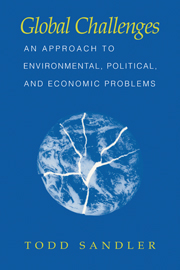Book contents
- Frontmatter
- Contents
- List of tables and figures
- Preface
- Acknowledgments
- 1 Apocalypse now or never?
- 2 Global interdependencies: Basic tools and principles
- 3 For our children's children
- 4 Global house
- 5 Architecture of institutions
- 6 Change we must: Evolutionary concerns
- 7 Equity among nations?
- 8 Near horizons
- References
- Author index
- Subject index
3 - For our children's children
Published online by Cambridge University Press: 05 June 2012
- Frontmatter
- Contents
- List of tables and figures
- Preface
- Acknowledgments
- 1 Apocalypse now or never?
- 2 Global interdependencies: Basic tools and principles
- 3 For our children's children
- 4 Global house
- 5 Architecture of institutions
- 6 Change we must: Evolutionary concerns
- 7 Equity among nations?
- 8 Near horizons
- References
- Author index
- Subject index
Summary
Decisions today may have implications well into the future and, as such, may influence the well-being of generations to come. For the world fisheries, harvesting decisions today can destabilize marine ecosystems and even drive some species into extinction, thus affecting the welfare of all subsequent generations. The application of modern technologies – satellite global positioning systems, radar – have severely depleted some species' stock and, thus, have imperiled the commercial viability of these species. As another instance, consider biodiversity, where the existence of large numbers of species adds to the heritage of humankind. The stability of ecosystems depends in part on the presence of multiple species fulfilling similar functions, since disruption to the population of some species can be compensated by other species expanding to assume needed functions previously provided by the depleted population. Biodiversity is dependent on habitat, so that land conversion in the species-rich tropics can have serious consequences for the number of species. If biodiversity is to be preserved, then the current generation in a tropical country must be sufficiently farsighted to account for the impact of their land-allocation decisions on future generations at home and abroad. This is a tall order. Storage of high-level nuclear wastes, such as plutonium, is a prime example of how decisions today can impact the well-being of generations for millennia to come. Given the long half-life of plutonium-239 (24,000 years), nuclear waste repositories would have to protect the environment from nuclear contamination for literally hundreds of thousands of years.
- Type
- Chapter
- Information
- Global ChallengesAn Approach to Environmental, Political, and Economic Problems, pp. 52 - 83Publisher: Cambridge University PressPrint publication year: 1997



